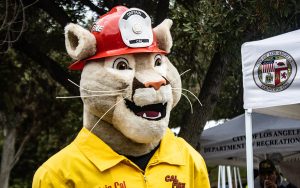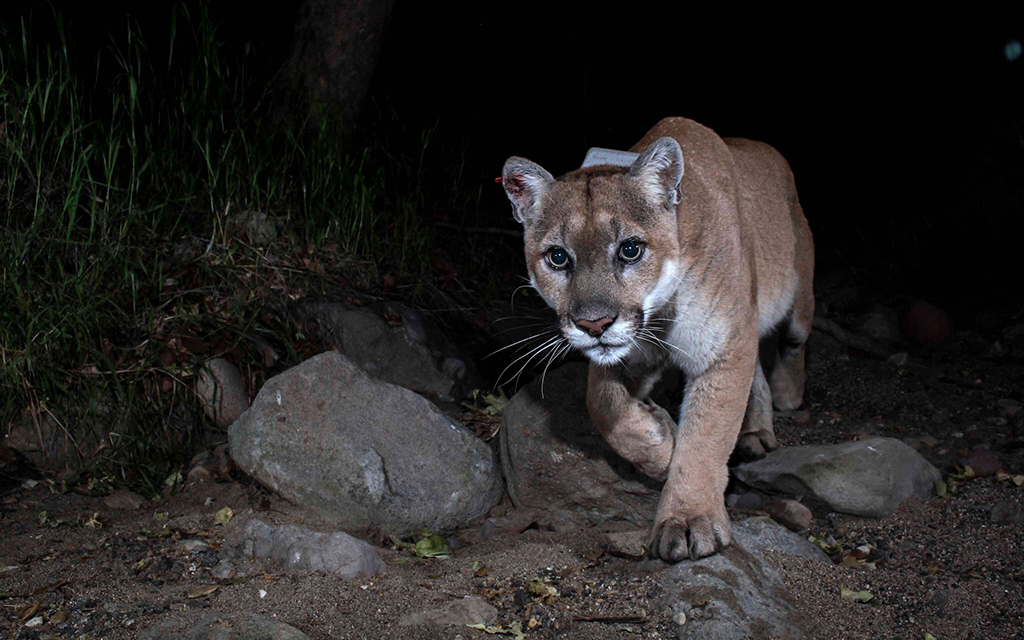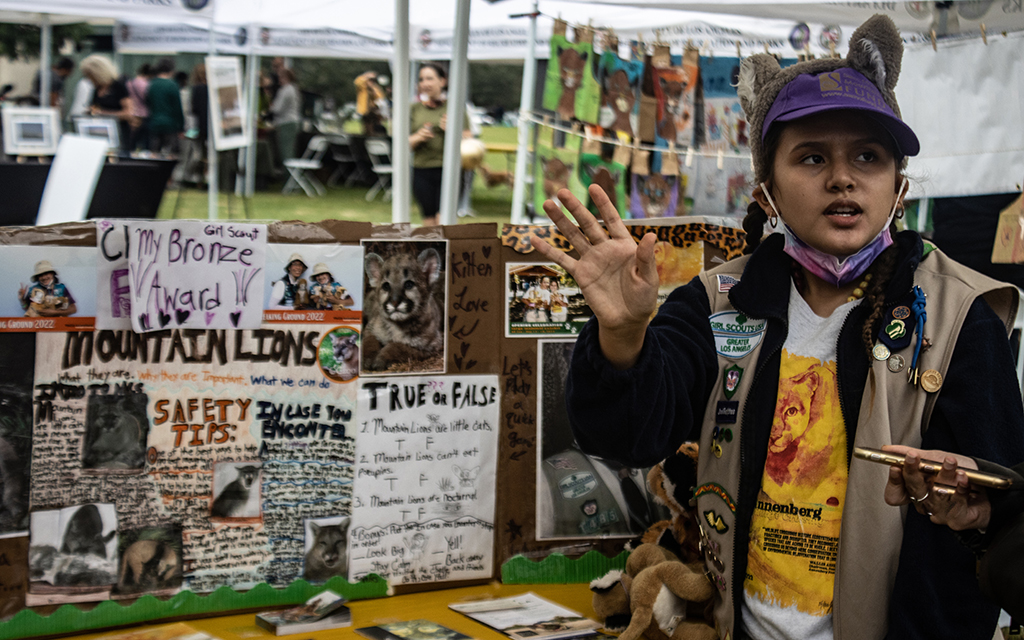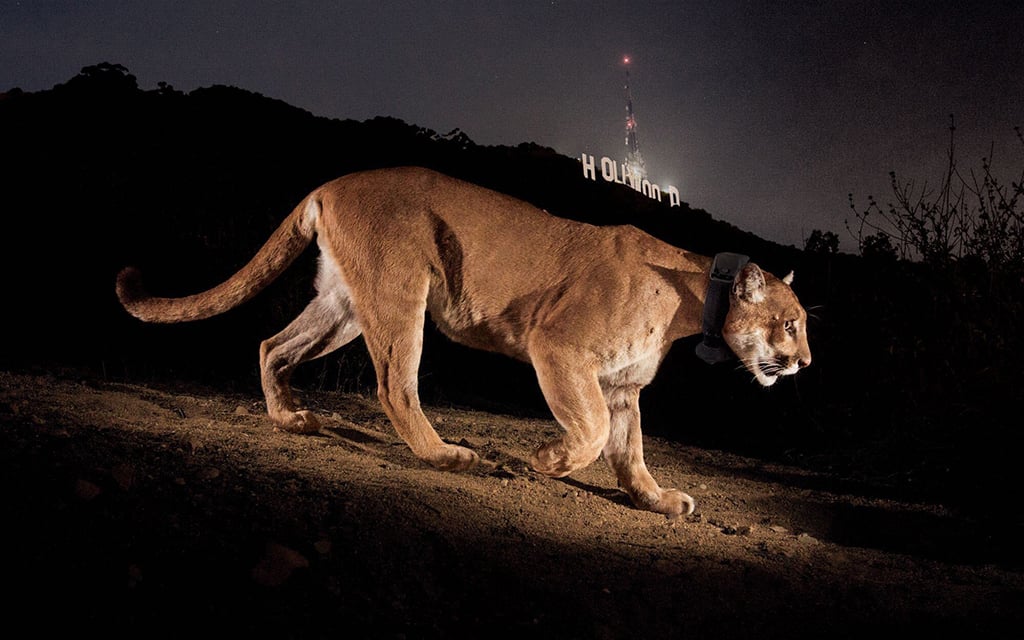LOS ANGELES – P-22 is an unsexy name for this city’s sexiest beast: a male mountain lion residing in the urban wilderness of Griffith Park.
P-22 is LA’s rocking celebrity. The big cat’s mystique is based on his sinewy physique, longevity and elusive nature – and the fact his domain includes some of the city’s most exclusive neighborhoods nestled below the Hollywood sign.
The mountain lion was first spotted on camera 10 years ago and is seen about as rarely and briefly as a beanie-topped Harry Styles ambling through a parking lot with a smoothie.
Like Styles, the cat has become so popular that he has his own day. In 2016, the City Council designated Oct. 22 as P-22 Day. On Saturday, crowds of wildlife enthusiasts flocked to Griffith Park to celebrate their hero with hip-hop music, dancing, puppet shows, crafting butterfly gardens and posing for photos with a human in a kitty costume.
The phenomenon of an 11-year-old mountain lion roaming the hills in some of LA’s hippest neighborhoods has earned P-22 cult status. Over the years, P-22 periodically has graced the front page of the Los Angeles Times, with updates on new sightings.
He has made occasional trips to Los Angeles Zoo, which is in the park. One outing included making a midnight snack out of a koala. Always the party crasher, he has shown up uninvited at houses in the Hollywood Hills, Silver Lake and Los Feliz neighborhoods.
Around LA, he remains a household name and not just because he shares the same tawny tint as Brad Pitt.

Capt. Cal, mascot of the California Department of Forestry and Fire protection, attends P-22 Day, which honors an aging mountain lion living in and near Griffith Park in LA (Photo by Emeril Gordon/Cronkite News)
“I think LA loves celebrities. But I think more than that, it’s a touch of wilderness that we’ve lost in urban areas“ said Beth Pratt, California director for the National Wildlife Federation.
Thus, P-22 mania is about a lot more than a single mountain lion. He stands in large part as an icon for the need to save his species, whether in cosmopolitan cities or rangeland.
Many mountain lions have been captured by the National Park Service, often as kittens, given tracking collars and released into the wild with their own P designations. Most didn’t live past age 2.
Many big urban cats die when struck by cars. P-97, for instance, was found dead in April on the Interstate 405 on the westside of LA, the Times reported. But there are other causes, too, such as mange, which claimed P-65 in the Santa Monica Mountains in March, or ingesting rat poison from consuming animals that had eaten rodents. That’s the likely cause of death for P-54, also in the Santa Monicas.
In deep appreciation for mountain lions, millions of dollars were raised to build a landscaped wildlife bridge over Interstate 101 northwest of Los Angeles in the hope that the cats will use it to wander in search of mates, food or to extend their turf, rather than trying to dodge cars crossing the freeway. Construction began in April.
“Angelenos in the greater Los Angeles area have said, ‘Not only do we care about P-22, but we want mountain lions here in the future so much. So we’re going to build this $92-million bridge to ensure a future for mountain lions,’” Pratt said.

This shot shows P-22 at night in Griffith Park in Los Angeles, close to some of the city’s toniest neighborhoods. (Photo by Miguel Ordeñana)
Mountain lions are considered a “specially protected animal” in California and can’t be hunted, but experts say there’s a long-term threat due to loss of habitat and isolation, which leads to inbreeding. The National Wildlife Federation says populations are stable in the West, although they have significantly decreased. California wildlife officials have estimated as many as 3,000 cougars roam the state, down from 4,000 to 6,000 in 1996.
California’s feline-friendly attitude contrasts sharply with those in Arizona, which allows the hunting of mountain lions from August to May. Arizona has strict limits and verification requirements to ensure the state’s population stays stable.
Although safe from hunters, P-22 knows all about cheating death. He’s avoided being hit by cars despite inhabiting areas with heavy traffic and sharp curves. At one point, he developed a serious case of mange that left him looking like so many other celebrities that have hit rock bottom – droopy, bleary eyes; whiskers gone haywire and an overall sloppy, wholly unphotogenic appearance.
One of the first sightings of P-22 was from behind. Miguel Ordeñana, a wildlife biologist, was conducting a study in Griffith Park when suddenly he saw the unmistakable black tail and butt of a mountain lion.
“It was an awe-inspiring moment, like seeing Bigfoot for the first time. It was something that was unexpected,” Ordeñana said.
At least he knew what he was viewing. Now, “people send in their photos of him,” unsure whether they’ve seen a large house cat, domesticated dog or coyote.
To have proof of P-22 was a very personal experience for Ordeñana, who had grown up near Griffith Park, spent much of his childhood there and had developed a deep appreciation for the animals he encountered there.
“I feel like animals are voiceless. I know how that feels like. I know what it feels like to not feel heard and supported,” he said. “And, I think wildlife don’t have those same emotions. But I feel like they are discriminated against, they’re persecuted.”
P-22 wears a tracking collar so the National Park Service can keep tabs on his location, but to protect him, that data is not released publicly. Nevertheless, P-22 knows the celebrity life all too well, constantly having his privacy invaded by wildlife paparazzi, Ring doorbell cameras, outdoor security cameras and the occasional cellphone snapshot. Yet he remains on the prowl, just another lonely bachelor roaming the Hollywood Hills.
At P-22 Day, children couldn’t get enough of the story of the big cat. Girl Scout Chelle Mendivil dedicated an entire project to raising awareness of cougars. For her, P-22 represents all wild animals that are powerless against humans.
But in true celebrity fashion, P-22 took the A-lister route by being a no-show at the festival in his honor.
At least, though, he lent his fame to the campaign for the wildlife bridge.
“This isn’t just an LA story,” Pratt said. “It’s not just even a California story. We had donors from all over the world because his story was so compelling. And I think it puts a very human face on a wildlife problem.”



